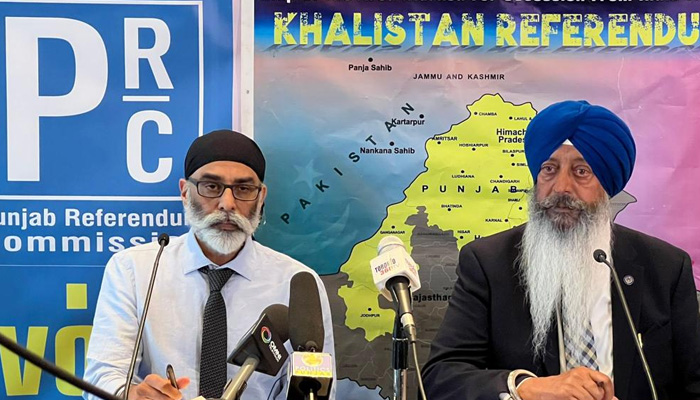Canadian think tank’s report endorses Khalistan Referendum
LONDON/TORONTO: Two leading international authorities on the right of self-determination have said that the Sikh advocacy group Sikhs for Justice (SFJ) are rightly campaigning to raise awareness and put pressure on India to hold an official referendum on the creation of Khalistan.
In a press conference in Toronto and online discussion, the chairman and members of the Punjab Referendum Commission (PRC) — a panel of non-aligned experts on direct democracy who is supervising and monitoring the Khalistan Referendum Voting — released the report “From Golden Temple to Punjab Independence” jointly published by Quebec based Research Institute on Self-Determination of Peoples and National (IRAI). The report reviewed the validity of the ongoing Sikh secessionist referendum under international laws and established democratic norms.
The Khalistan Referendum is a global initiative launched by SFJ in which Sikhs across the world are voting on the question: “Should Indian Governed Punjab Be An Independent Country?” Experts Matt Qvortrup and Dane Waters, the chair of the Punjab Referendum Commission, explained the significance of the referendum at a press conference.
Qvortrup said that the referendum is being held in a free, fair and transparent manner and according to international standards. He said that referendum voting in the UK and European capitals had been a huge success and registered as a new model of campaigning. He said the model followed by SFJ can serve as a beacon for all those nations, ethnicities and groups who want to obtain their right to self-determination through peaceful ways.
According to experts, the referendum is unofficial but it will have a political impact and symbolic value as a democratic process that will send a signal and solidify support on the issue of Khalistan.
They said the process of the referendum is hugely important as people express their opinion through voting. The experts said the referendum will be an opportunity for Sikhs in Canada to express their opinion.
The panellists said if India wanted to be seen as a democracy in the world, then it has to act as a democracy. They also regretted that India has blacked out the news about the Khalistan issue.
Paul Jacobs, President of Citizens in Charge and Citizens in Charge Foundation and a member of the commission, said the issue of self-determination in a referendum was very consequential.
“We believe in the power of the vote,” said Jacobs. He quoted Winston Churchill who once said that: “democracy is the worst form of government – except for all the others that have been tried. Our goal is to help make the referendum as good as it can be.”
SFJ spokesperson Gurpatwant Singh Pannun welcomed the release of the report and termed it a major intellectual contribution to the legitimate struggle for Khalistan. Pannun reiterated SFJ’s position that the “Khalistan Referendum is not about re-establishing Maharaja Ranjit Singh’s ruled country but liberation of Punjab from Indian occupation and reclaiming Shimla as headquarters as was in 1947 when Punjab was governed under the Indian Rule.”
-
 ‘Stingy’ Harry, Meghan Markle Crack Open A Chasm Despite Donation: ‘Do So At Your Own Peril’
‘Stingy’ Harry, Meghan Markle Crack Open A Chasm Despite Donation: ‘Do So At Your Own Peril’ -
 Research Explores How TikTok’s Recommendation System May Influence Teen Beliefs
Research Explores How TikTok’s Recommendation System May Influence Teen Beliefs -
 Google Wins Approval To Export South Korea’s High-precision Maps After 20 Years—With Strict Conditions
Google Wins Approval To Export South Korea’s High-precision Maps After 20 Years—With Strict Conditions -
 King Charles’ Health Battle: What Has Been Revealed About His Cancer So Far
King Charles’ Health Battle: What Has Been Revealed About His Cancer So Far -
 Bad Bunny Tugs At People’s Heartstrings With A Generous Act Of Love: ‘Our Staff Didn't Even Realize’
Bad Bunny Tugs At People’s Heartstrings With A Generous Act Of Love: ‘Our Staff Didn't Even Realize’ -
 Paramount Wins Warner Bros. Bidding War As Netflix Abandons Deal: Here’s Why
Paramount Wins Warner Bros. Bidding War As Netflix Abandons Deal: Here’s Why -
 Cardi B Finally Responds To Accusations About Destroying 'SNL' Set After Nicki Minaj Joke
Cardi B Finally Responds To Accusations About Destroying 'SNL' Set After Nicki Minaj Joke -
 Gorton And Denton By-election Result: Green Party Defeats Labour In Blow To Keir Starmer
Gorton And Denton By-election Result: Green Party Defeats Labour In Blow To Keir Starmer -
 Jack Dorsey Cuts 4,000 Roles, Says AI Requires Smaller Teams
Jack Dorsey Cuts 4,000 Roles, Says AI Requires Smaller Teams -
 Reggie Bannister Health Takes ‘difficult Turn’ Amid Dementia, Parkinson’s Battle
Reggie Bannister Health Takes ‘difficult Turn’ Amid Dementia, Parkinson’s Battle -
 'Humble Traitor' Rob Rausch Makes Unexpected Move After Betraying Maura Higgins In Season 4
'Humble Traitor' Rob Rausch Makes Unexpected Move After Betraying Maura Higgins In Season 4 -
 Sarah Ferguson Drops An Accusation Against Andrew? ‘He Just Wants Leverage’
Sarah Ferguson Drops An Accusation Against Andrew? ‘He Just Wants Leverage’ -
 Anthropic Rejects Pentagon Military AI Proposal, Holds Firm On Safety Guardrails —What’s Next?
Anthropic Rejects Pentagon Military AI Proposal, Holds Firm On Safety Guardrails —What’s Next? -
 'Traitors' Reunion Drama: Rob Rausch Defends Strategy, Makes Shocking Revelation After Victory
'Traitors' Reunion Drama: Rob Rausch Defends Strategy, Makes Shocking Revelation After Victory -
 Inside Hillary Clinton’s Epstein Testimony: Key Takeaways And Highlights Explained
Inside Hillary Clinton’s Epstein Testimony: Key Takeaways And Highlights Explained -
 'Too Hard To Be Without’: Woman Testifies Against Instagram And YouTube
'Too Hard To Be Without’: Woman Testifies Against Instagram And YouTube




